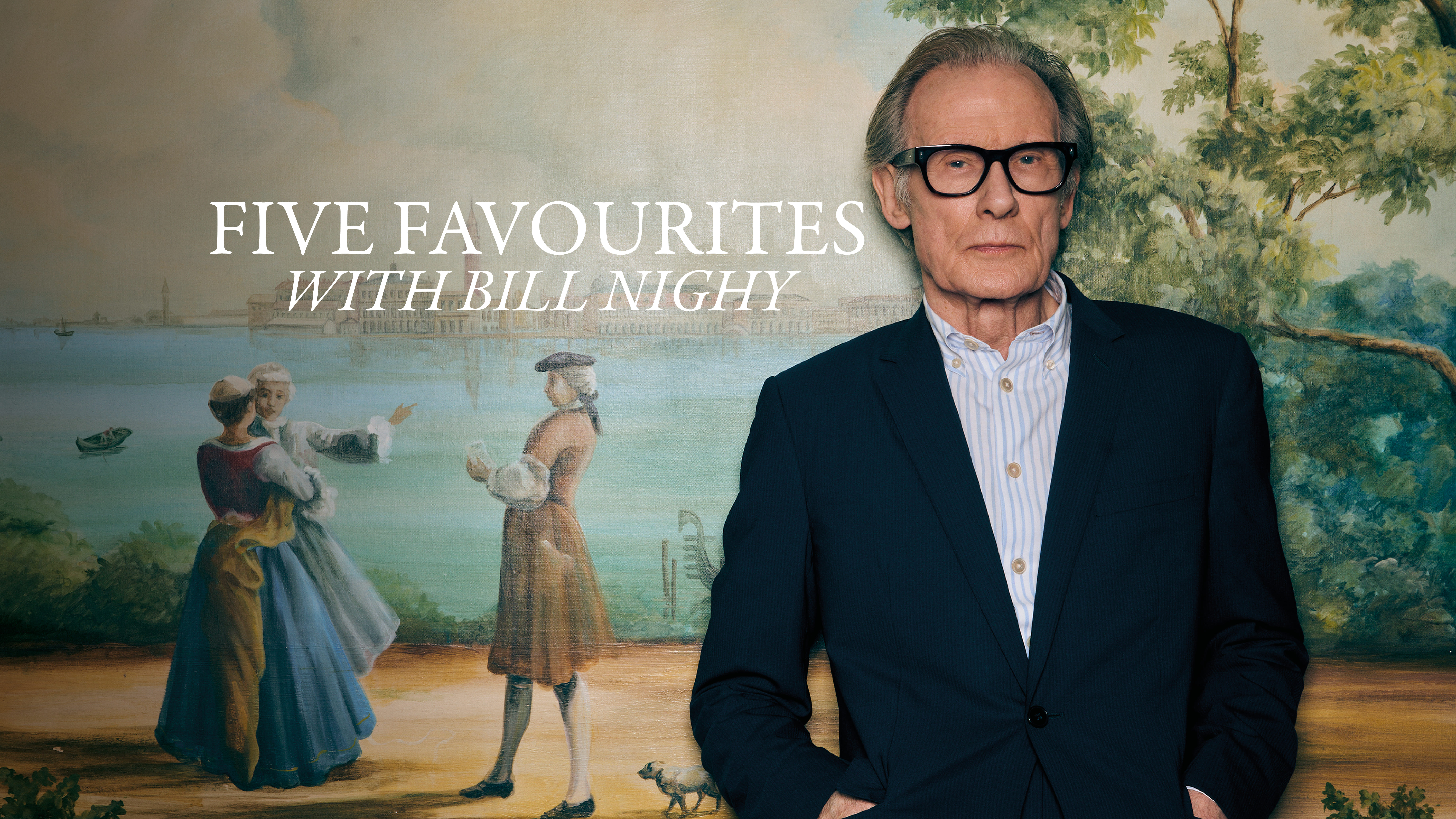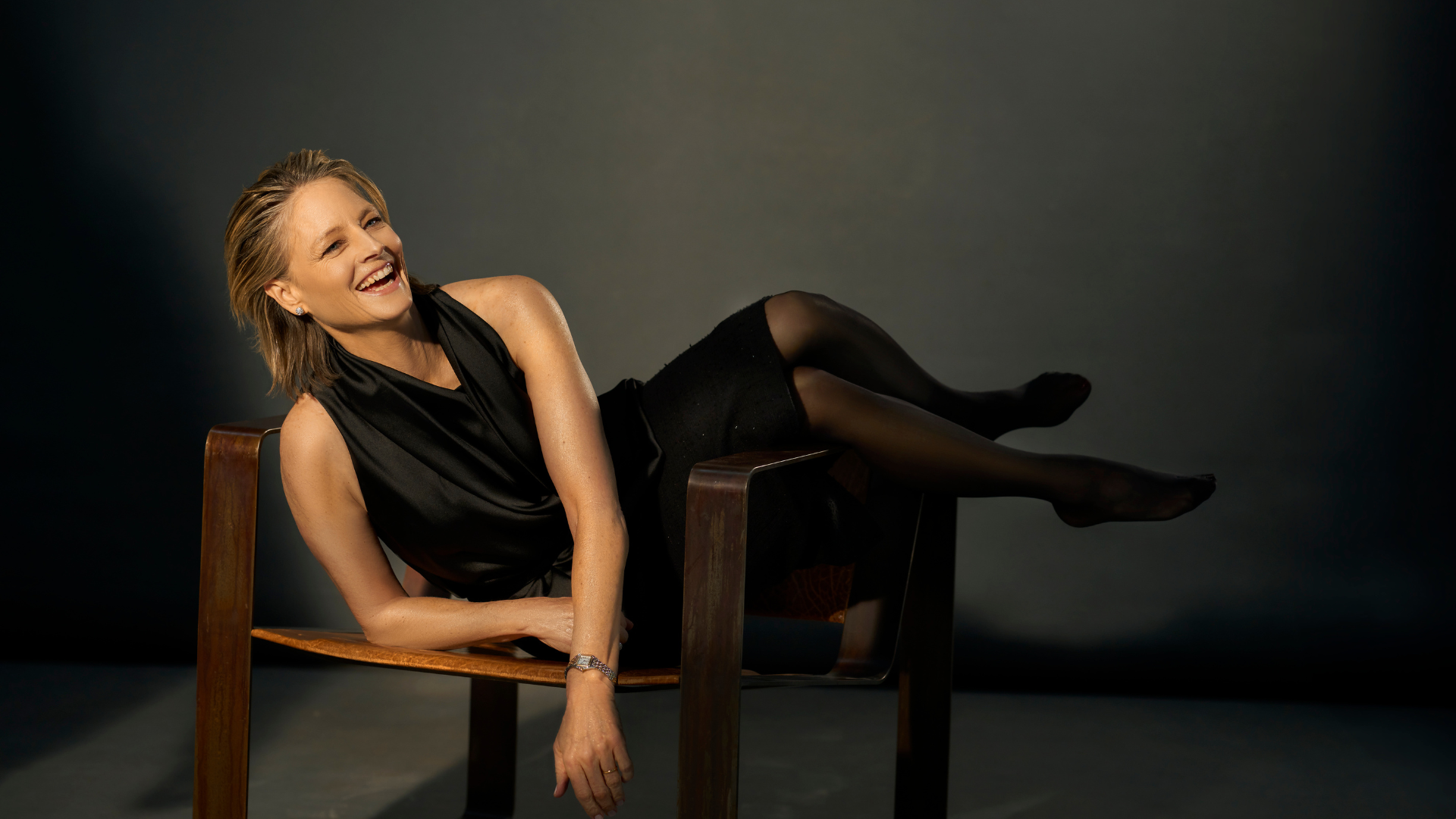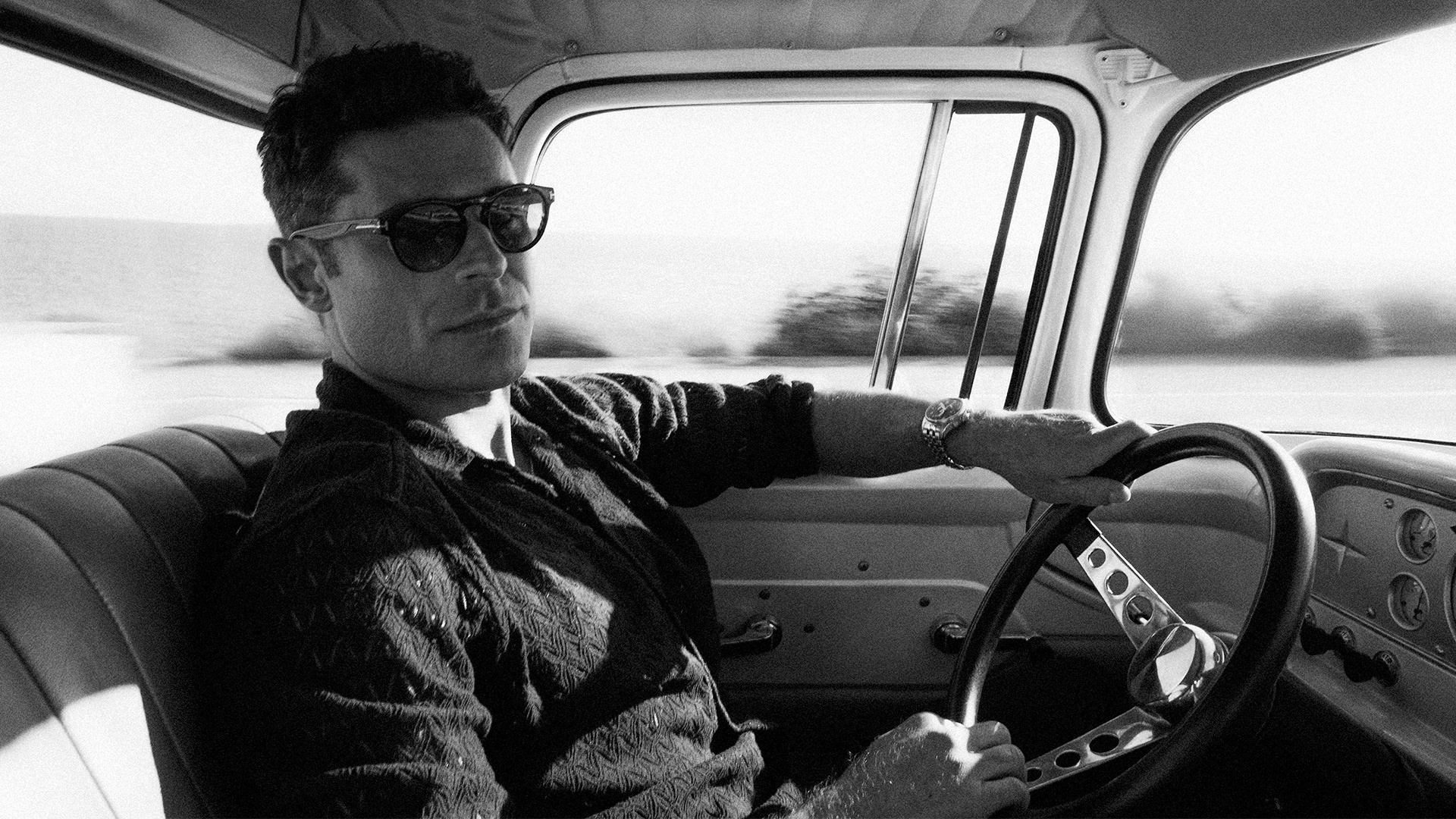The Rights Of Bill: Bill Nighy is The Rake's Issue 93 Cover Star
‘If you want to be paranoid and undermine yourself, be an actor,’ Bill Nighy tells us. He speaks from half a century of hard-won experience. Perhaps it’s why one of Britain’s best-loved stars remains as humble and relatable as ever.

As far as I can tell, Bill Nighy likes to keep things simple. I approve of this attitude — people who want to make the world more complicated than it needs to be give me anxiety, and I’d rather avoid being anxious, if that’s O.K. Simplicity got him to our interview — he walked to and from The Savoy via the melee of London’s Strand, the southern boundary of the West End. The comfort he has in himself makes for comfort in those around him. “I’ve got time, don’t worry about that,” he says as we sit down. Time was required, because even though his long career famously went largely unnoticed until his appearance in Love Actually (2003), his is a life with a narrative arc that might easily have featured in the fiction books he enthusiastically ploughs through.
Nighy is a passionate man who wears his passion subtly. He is not an evangelist but a quiet, contemplative man who expresses himself in a delicate way. He was born in 1949 and grew up in the North Downs, a beautiful, verdant suburban part of England to the south of London. These days we are talking prime commuter belt — a short train ride (as long as they’re running) to Victoria Station, and as much a beneficiary of the 20th century property boom than the other home counties. In the early 1950s, the scene would have been quite different. The war was over and Britain was rebuilding. Rationing would be in effect for another five years or so, and the mood, while victorious, was tough for all involved.
Bill’s mother was a nurse, and moved south, from Glasgow to Caterham, looking for work: she found it at the nearby psychiatric institutions. Bill got a job as a porter in Caterham when he left school at 15. It would have been more shire-like in the fifties for our young cover star. “It was surrounded by woodland, and you could roam free,” he recalls. “The cliché is that in those days you could kick your kids out of the door and not worry too much in a way you cannot do now.”
He has an elder brother, Martin, whom he always looked up to and who helped him (even unknowingly) cut his teeth in the sartorial arts. “Martin needed suits for work, and he had several,” Bill says. “I was never allowed to touch them, but as soon as he was out of the house I was straight into the wardrobe. They were Italian style. He looked very good and very sharp.”
Though the influence of our families is something we often try to shake off, some things stick — so it was with Martin and Bill, with style, music and his identification as a mod. “Let me be clear,” Bill says, “we are not talking about scooters here, this is a sub-genre: we used to risk calling it ‘top mod’. [The actor] Martin Freeman says I am not a true mod, and he’s right — I am not as committed as he is, or Paul Weller, for instance. [They] are the two shining lights of real modernism, but I do help them out when they are busy.”


It is critical to see Nighy’s code of classic style through the lens of the modernist movement. His decision to wear double-pleated trousers and capped-toe Oxfords at a young age was ironic: he was wearing them because he wasn’t supposed to be wearing them, not because he was trying to fit in with a certain social class. It was a rebellion against expectations. He says: “If your destiny was a middle-class one, which was basically white collar, if you became an actor you’d take advantage of the fact that you didn’t have to wear a white collar. People relished that. For those who were presumed to be blue collar, when they became actors they would dress up.” Class informed much of his youth and his vocation. When he joined the Guildford School of Acting, “I was taught which knife to use at dinner. Because they had an influx of working-class kids, they were worried, on their behalf, that they would be put in a position where they didn’t know which cutlery to use. And I was taught the polka.” Can he still dance the polka? “I probably could if you asked, but I have never been asked to do it for money.”
He certainly knows his audience. This part of the interview was the first, though not the last, time that Bill and I found ourselves going down a sartorial rabbit hole. His reputation for being a well-dressed, classic gent has not been built by accident. He is not a dandy, and he does not dress with any modern trend in mind; it is more important than that: it is a reflection of his character, his individuality, his sense of humour and his values. His opinions on clothes employ the kind of granular detail that puts the staff of this magazine to shame, the Editor-in-Chief included. For example: “I have a problem with men’s cardigans — they are all four inches too long.”
The costume designer would say, ‘Put it in your bag’. Often the only clothes I had were the clothes from my last job.
Early in his career, the clothes were much more than a costume. “If I got a job that was a suit-job, the costume designer would often let you buy it at half price, and very occasionally they would say, ‘Go on, put it in your bag’, and so often the only clothes I had were the clothes from the last job I did.” His confidence in himself has always hung in the balance. Even his success has not always guaranteed an emotional bank vault filled with assuredness and pride in his achievements, of which there are many. “I have an anti-talent,” he says. “I have a great gift for undermining myself. I mean, if you want to be paranoid and undermine yourself, be an actor.”
Fortunately for Bill, one of the advantages, as far as he sees it, of getting his big break in Love Actually in his mid fifties (he played the loose-cannon rock star Billy Mack) was that a major part of the actor’s life — auditioning — was taken away. For the rest of us, we live in blissful ignorance about whether jobs we unsuccessfully apply for are missed opportunities, but actors sometimes have to watch someone else get the gig and then go on to make millions with it, which must be a bitter pill. “I auditioned like every other actor for many, many years,” he says. “I sat in the anteroom of various grim offices and had to do internal monologues on an imaginary horse or sword-fight with no one, and do all kinds of exposing things with people who remained apparently completely unimpressed, and nine out of 10 times you wouldn’t get the gig. If you want to make yourself unhappy, that’s a pretty good start.”
That’s not to say he did everything in his power to mitigate the chances of failure. His approach in the early years, while perhaps in line with his peers, was seemingly a stepping stone to the veteran professional we know and love today. He says: “I used to wing it, along with everybody else. When I was young and I was an average mess and I had left the script in someone’s flat, where I was sleeping on their sofa, I would be the one who would turn up and ask the stage manager if they had a script. So I know about winging it and I know how pleased you feel when you get away with it — in other words, when you do no work.”
I used to wing it, along with everybody else... I know how pleased you feel when you get away with it.




These were also the days when his capabilities as an actor were still forming, and this contributed to his apparent louche attitude to work. “The script made me uneasy because it almost certainly contained things that I wouldn’t be able to pull off,” he says. “So I didn’t want to look at it too much.” Initially, once he’d left drama school, the one job out of 10 that he got was for theatre work. He began in regional theatre and found his way into elevated company at the Everyman in Liverpool. In the late seventies and eighties he’d appear in plays at the National and in the West End, as well as radio plays for the BBC.
His collaborations with the playwright David Hare helped him overcome his self-consciousness. “I was so in line with what the plays were attempting to express that I was able to focus on something other than, ‘How do I look, how is my career?’,” he says. “I had a higher purpose, not to be too la-di-da about it.” There was humility in this: he was, and still is, laser-focused on producing the best work possible, and doesn’t let pride or ego interfere. Some actors refuse to take what is referred to as a ‘line reading’ from the director, when the director delivers the line in his or her preferred way. Bill is more pragmatic than other actors. “I don’t mind it at all,” he says. “I don’t understand why people would. If anyone’s got a better idea of how to say it, I am absolutely fine with that. If I get told to move into ‘secondary energy’, I get a bit lost: I need to know how to cross the room or how to reach a coffee cup. Acting is a series of actions, it is not theoretical.
I was involved in a long, gruelling campaign to obscure the fact that I couldn’t act. When people got together at night in their digs and spoke till the early hours about their method, I would creep away or put the kettle on.
“The other thing is the tyranny of feelings: the idea that you have to feel everything in order to give the impression that you feel everything, which is a sort of outsider’s view. I was involved in a long, gruelling campaign to obscure the fact that I couldn’t act. I didn’t want to think about [things like Stanislavski] at all. When people got together at night in their digs and spoke till the early hours about their method, I didn’t know how to do it, and I was pretty certain I couldn’t do it anyway, so I would just creep away or put the kettle on. I am sure what they were talking about was fine, but it just wasn’t for me.”
Various screen appearances in the nineties won him acclaim, but he had yet to break out in the way that fellow actors from his stage days, such as Anthony Hopkins, Jonathan Pryce, Pete Postlethwaite and Judi Dench, had done. This late ‘blossoming’, if you can call it that, is not something he resents: “I am glad it didn’t happen when I was 20, as I would have probably messed it up one way or another.”


Once it happened, however, he would leave an indelible mark on the celluloid landscape. His twitching, contorting, dry and captivating presence was similar in effect to Stanley Tucci’s, for example. Nighy had an aura that took ownership of a role, and once that was achieved, you knew it couldn’t be played by anyone else — even, and I mean this sincerely when it was a CGI ‘Squidman’ in 2006’s Pirates of the Caribbean: Dead Man’s Chest (and its follow-up, At World’s End). The first film in the series, The Curse of the Black Pearl, had no shortage of big performances, including from Johnny Depp and Geoffrey Rush — a kind of ‘how do you follow that?’ challenge that Nighy needed to take up, which he did. Clad in grey pyjamas and CGI markers, and assisted by a team of technical wizards who won an Oscar for best visual effects, he was a strutting, malevolent, complex and, crucially, memorable foil to Depp, Rush, Orlando Bloom and Keira Knightley. Like many actors, Nighy hates watching himself on screen, though Davy Jones in Pirates of the Caribbean was the exception.
By now his influence in the industry was changing. “It happens incrementally,” he says. “It started after Love Actually — the first couple of times I went for a job, there was something ‘off ’ about the interview. Then you work out that they are trying to sell you the job, not the other way round.” Following Dead Man’s Chest, Nighy was a living pendulum, moving between genres and character archetypes. His comic abilities, as well as his debonair, suave, sophisticated Brit that American audiences find so intoxicating, allowed him to excel in several roles, from the lovelorn Douglas Ainslie in The Best Exotic Marigold Hotel (shot in India, for which, in preparation, he packed a lifetime supply of Yorkshire Tea and Marmite) to Sergeant Wilson in the remake of Dad’s Army and his mirthfully dry portrayal of the hypochondriac Mr. Woodhouse in Emma.
Bill is the epitome of a gentleman. Charming, funny, kind, generous, warm and always sharply dressed.
Acting in a Jane Austen project was a bit off-piste for Bill, because of the clothing. “One of the reasons there is a significant lack of classical work on my C.V. is that I can’t operate in those kind of trousers,” he says. Fortunately, when he began filming Emma, he went to see the costume designer, Alexandra Byrne, to request “no britches”, and she told him he was lucky, as it was set when the trouser was just coming into fashion. Another of the films in this run was the impossibly stylish Their Finest, in which Bill played a flirtatious actor (sometimes in a perfectly proportioned cardigan), Ambrose Hilliard. His co-star Sam Claflin jumped at the chance to sing Bill’s praises. “Well, quite simply, he’s the epitome of a gentleman,” Claflin told The Rake. “Charming, funny, kind, generous, warm and always, always sharply dressed. I bumped into him one morning on a day off during filming: he was sat there in a beautiful navy suit, open-collared shirt, a small coffee on the go, reading a newspaper, greeting every single passer-by with a ‘good morning’.”






At the same time, Nighy would trade levity for gut-wrenching emotional performances. Some of his finest work of that ilk include playing Alan in Sometimes Always Never; James in Richard Curtis’s Capra-esque About Time (“I walk everywhere and I meet a lot of people, and the film, without question, that people want to talk about is About Time”); and Rodney Williams in Living, Nighy’s portrayal of a man desperate to come out of his shell after a terminal diagnosis, a world away from his bureaucratic job in disciplined post-war London. Living was an Anglicised version of the 1952 Kurosawa film Ikiru; the 2022 iteration was written by Kazuo Ishiguro, with Bill earmarked to play Williams. It would end up earning him his first Oscar nomination, for best actor.
The film Sometimes Always Never began life with another title, and the original lead character was not a tailor. But the writer Frank Cottrell-Boyce came on board and produced a second draft that was, Bill says, “entirely linked to the fact that I have a fetish for lounge suits”. Even the film’s name was changed after Bill mentioned the rule of buttoning a three-button jacket: sometimes, always, never.


Photo Team: Garth Mckee and Joshua Hippolyte
Grooming: Chad Maxwell at Stella Creative using Augustinus Bader
Production: Sam Shane at JJ Media
Fashion Assistant: Helly Pringle





